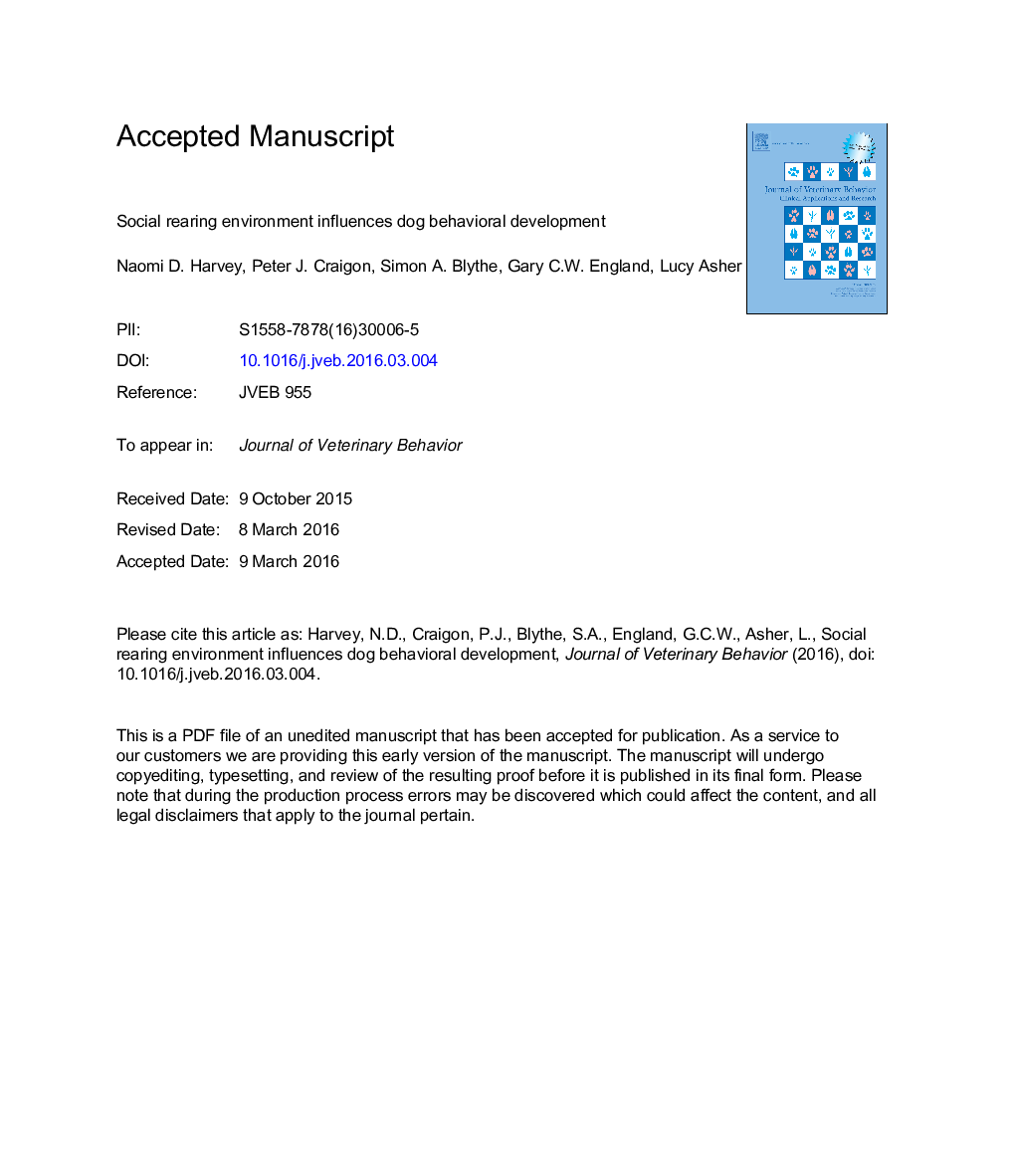| کد مقاله | کد نشریه | سال انتشار | مقاله انگلیسی | نسخه تمام متن |
|---|---|---|---|---|
| 5535878 | 1551600 | 2016 | 31 صفحه PDF | دانلود رایگان |
عنوان انگلیسی مقاله ISI
Social rearing environment influences dog behavioral development
ترجمه فارسی عنوان
محیط کشت پرورش دهنده بر توسعه رفتاری سگ تاثیر می گذارد
دانلود مقاله + سفارش ترجمه
دانلود مقاله ISI انگلیسی
رایگان برای ایرانیان
کلمات کلیدی
نوجوان، سگ، شخصیت، جمعیت شناسی، پرسشنامه،
موضوعات مرتبط
علوم زیستی و بیوفناوری
علوم کشاورزی و بیولوژیک
علوم دامی و جانورشناسی
چکیده انگلیسی
Early life experiences are known to influence behavior later in life. In dogs, environmental influences of early home rearing could be exploited to improve the chances of developing adult behavior most suited to the adult environment. For working dog organizations, such as Guide Dogs, suitable adult behavior is important to ensure that dogs can fulfill their role as guides for people with visual impairment. Here, we test the hypothesis that dogs' home rearing environment will influence behavioral development. To investigate this hypothesis, carers of potential guide dogs (puppy walkers) completed a questionnaire, termed the Puppy Walker Questionnaire (PWQ), about the dog's behavior at 5, 8, and 12Â months of age. An additional 11 questions were answered about the home environment at the last assessment. Because no questionnaire existed which measured behavior most relevant to Guide Dogs, questions from an existing questionnaire (Canine Behaviour and Research Questionnaire) were combined with additional questions. Thus, a subsidiary aim of the study was to test the reliability of the PWQ for measuring behavioral development of potential guide dogs. The PWQ, scored on a 100-mm visual analogue scale, grouped into 5 new scales: trainability, distractibility, general anxiety, body sensitivity, and stair anxiety, with 4 Canine Behaviour and Research Questionnaire scales: excitability, separation-related behavior, attachment and attention seeking, and energy level. For each reliable scale, multivariate linear regression identified significant predictors from the home environmental questions. The results suggest that home rearing environment is indeed important for behavioral development: 9 of 11 environmental variables were significant predictors of behavioral scores. Those environmental variables that appeared most important were social in nature. Dogs were scored as higher in energy level, excitability, and distractibility if they had been raised in a home with children, lower on energy level and distractibility the more experience of puppy walking their carer had, and lower on separation-related behavior the more they had been able to play with other dogs. These findings have implications for matching between dogs' early and later home environments. Follow-up of dogs in this study could help to elucidate effects on guiding suitability and matching between dog and guide dog owner.
ناشر
Database: Elsevier - ScienceDirect (ساینس دایرکت)
Journal: Journal of Veterinary Behavior - Volume 16, NovemberâDecember 2016, Pages 13-21
Journal: Journal of Veterinary Behavior - Volume 16, NovemberâDecember 2016, Pages 13-21
نویسندگان
Naomi D. Harvey, Peter J. Craigon, Simon A. Blythe, Gary C.W. England, Lucy Asher,
